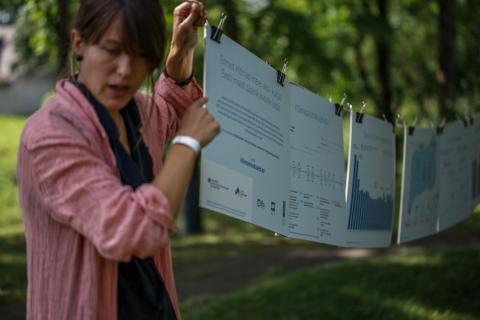European Economic
and Social Committee
Tired of listening to the same excuses, three Estonian NGOs - the Estonian Green Movement, the Estonian Fund for Nature and the Estonian Environmental Law Centre - decided to step into the game and bring together different stakeholders for a debate on a just transition in a country which has until recently had one of the biggest carbon footprints in the world. Their communication project put a focus on the north-east region where oil shale is still the king of fuels and in which most jobs depend on the oil shale industry, which will have to be phased out. It was not going to be an easy debate, but the results have been encouraging.
EESC info: What prompted you to launch your project or initiative?
Madis Vasser: Estonian environmental movements had been calling for the phase-out of fossil fuels for decades, but the requests were always met with the same excuses - what about jobs? what about the economy? it is too difficult, who should be responsible? etc.
So in 2018 three NGOs decided to launch a joint project to lead a meaningful dialogue between all stakeholders about just transition away from our main fossil fuel, which is oil shale.
How was your project received? Did you have any feedback from the people you helped? (Can you give an example if you have?)
The reception was good - representatives from all sides did actually come together to discuss the issues. As one representative of a municipality in the oil shale mining region later recounted, he was expecting another useless environmental meeting, but the event was actually really meaningful.
During and after the project we have had close contacts with local people, industry representatives and government officials - partly due to this networking Estonia was one of the first Member States to finalise their territorial just transition plan for the just transition fund.
How do you intend to use this specific funding to provide more help to the community? Are you already planning new projects?
We will use the funds to extend some of the activities from the initial project, such as coordinating a large NGO climate network that fosters cooperation between local organisations on climate issues.
The support is also used for developing follow-up projects, now focused more on the local level.
What advice would you give to other organisations to get results in activities and programmes of this type?
As one training session from the EUKI programme stated well: "step into the game" and "embrace conflict". This means do not be afraid to approach different stakeholders, as right now might be exactly the time that they are thinking along the same lines as you.
But at the same time you must remember that some stakeholders might not trust each other at first, or have very different ideas about the best outcomes of this cooperation, so prepare for such conflicts and work through them instead of avoiding the issues.
How optimistic are you about the prospects for the EU to achieve the Green Deal targets?
I think ultimately the state of the environment will make us first be even more ambitious than now, and then to achieve these goals by way of more systematic changes to lifestyles and consumption patterns, as there is no other feasible way to mitigate the worst effects of the ecological and climate crisis.
